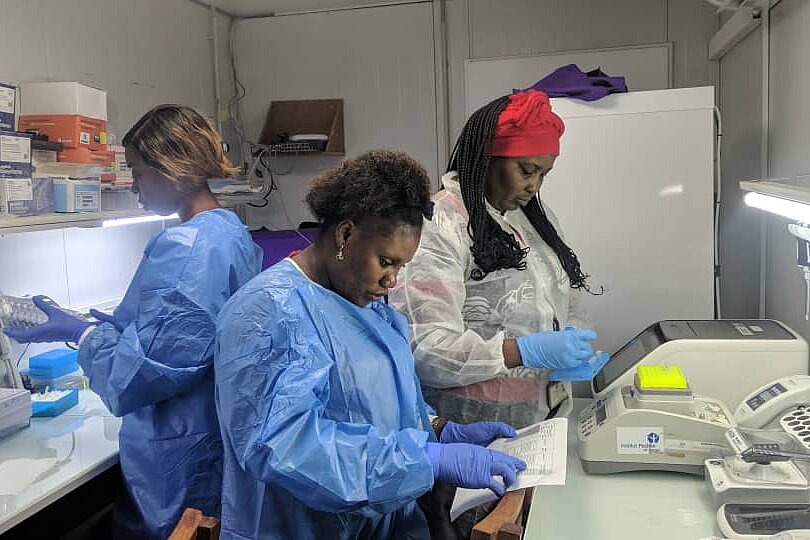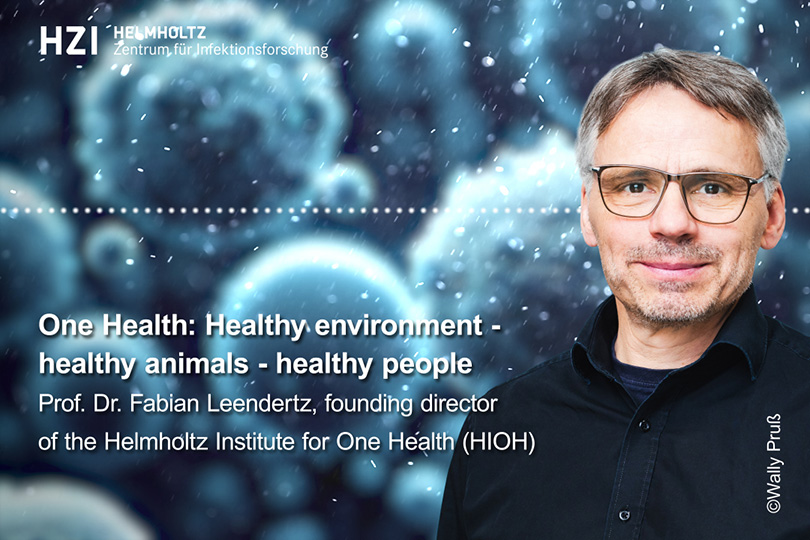
Ecology and Emergence of Zoonotic Diseases

Our Research
The Department of Ecology and Emergence of Zoonotic Diseases addresses the interfaces between humans, animals, and the environment, including climate, and explores the processes that facilitate the emergence of disease.
Based on data and samples from systematic long-term "One Health Surveillance" (coordinated by the OHS Core Unit at HIOH) and focusing on regions with frequent human-animal contacts, we study the transmission of clinically relevant pathogens as well as the ecological and socio-ecological conditions leading to human-animal contacts and transmission events. We do not focus on specific pathogens, but investigate the background of actually occurring infectious diseases.
Pathogens with zoonotic potential, which are identified in our screenings in sentinel regions, are subjected to in-depth investigations for a comprehensive understanding of their ecology. This approach enabled us to detect many relevant pathogens over the past two decades, e.g., monkeypox virus, Ebola virus, Bacillus cereus bv anthracis (BCBVA), Mycobacterium leprae, Treponema pallidum, respiratory pathogens, as well as other globally important agents (e.g., coronaviruses, paramyxoviruses, and viruses causing encephalitis).
In addition, to identify pathogens potentially relevant to human health, we exploit the evolutionary proximity to wild apes. This has led, among other things, to the discovery of leprosy in wild chimpanzees, suggesting unknown environmental reservoirs; to the discovery of the anthrax pathogen BCBVA, which can cause massive mortality in wildlife populations; but also to serological evidence of frequent BCBVA exposure in surrounding human populations. Cases of monkeypox in wild chimpanzees have also been documented, in turn prompting investigations of previously unknown reservoir species.
Generally, these studies serve to enhance global pandemic preparedness and prevention by improving our understanding of fundamental mechanisms of disease emergence and transmission between humans, animals, and the environment, but also through technology transfer to our partners in sub-Saharan Africa). Moreover, as an active member of several international global health networks (Scientific Advisory Board of the National Research Platform for Zoonoses, One Health Advisory Board of the Federal Ministry for Economic Cooperation and Development, Scientific Commission of the Great Apes Survival Partnership in the United Nations Environmental Programme), Fabian Leendertz decisively strengthens research and surveillance capacities in countries that urgently need such support.
In our department, the One-Health concept in research and teaching helps new generations of researchers learn to incorporate integrative One-Health thinking into problem-solving. Graduate students as well as undergraduates have the opportunity to learn state-of-the-art methods and apply them to unique data sets to answer both fundamental and translational research questions.
Our Research
The Department of Ecology and Emergence of Zoonotic Diseases addresses the interfaces between humans, animals, and the environment, including climate, and explores the processes that facilitate the emergence of disease.
Based on data and samples from systematic long-term "One Health Surveillance" (coordinated by the OHS Core Unit at HIOH) and focusing on regions with frequent human-animal contacts, we study the transmission of clinically relevant pathogens as well as the ecological and socio-ecological conditions leading to human-animal contacts and transmission events. We do not focus on specific pathogens, but investigate the background of actually occurring infectious diseases.
Pathogens with zoonotic potential, which are identified in our screenings in sentinel regions, are subjected to in-depth investigations for a comprehensive understanding of their ecology. This approach enabled us to detect many relevant pathogens over the past two decades, e.g., monkeypox virus, Ebola virus, Bacillus cereus bv anthracis (BCBVA), Mycobacterium leprae, Treponema pallidum, respiratory pathogens, as well as other globally important agents (e.g., coronaviruses, paramyxoviruses, and viruses causing encephalitis).
In addition, to identify pathogens potentially relevant to human health, we exploit the evolutionary proximity to wild apes. This has led, among other things, to the discovery of leprosy in wild chimpanzees, suggesting unknown environmental reservoirs; to the discovery of the anthrax pathogen BCBVA, which can cause massive mortality in wildlife populations; but also to serological evidence of frequent BCBVA exposure in surrounding human populations. Cases of monkeypox in wild chimpanzees have also been documented, in turn prompting investigations of previously unknown reservoir species.
Generally, these studies serve to enhance global pandemic preparedness and prevention by improving our understanding of fundamental mechanisms of disease emergence and transmission between humans, animals, and the environment, but also through technology transfer to our partners in sub-Saharan Africa). Moreover, as an active member of several international global health networks (Scientific Advisory Board of the National Research Platform for Zoonoses, One Health Advisory Board of the Federal Ministry for Economic Cooperation and Development, Scientific Commission of the Great Apes Survival Partnership in the United Nations Environmental Programme), Fabian Leendertz decisively strengthens research and surveillance capacities in countries that urgently need such support.
In our department, the One-Health concept in research and teaching helps new generations of researchers learn to incorporate integrative One-Health thinking into problem-solving. Graduate students as well as undergraduates have the opportunity to learn state-of-the-art methods and apply them to unique data sets to answer both fundamental and translational research questions.

Fabian Leendertz studied veterinary medicine at the University of Budapest and the Free University (FU) Berlin. In 2005, he became a doctor of veterinary medicine and group leader of the primate diseases group at the Max Planck Institute for Evolutionary Anthropology in Leipzig. Subsequently, at the Robert Koch Institute (RKI) Berlin, he led the Emerging Zoonoses Junior Research Group (until 2012) and qualified as a specialist veterinarian in microbiology. While heading the RKI project group Epidemiology of Highly Pathogenic Pathogens (2012 – 2021), he completed his habilitation in microbiology at the FU Berlin in 2016.
In 2021, Fabian Leendertz was appointed founding director of the Helmholtz Institute for One Health (HIOH) in Greifswald and a professor for One Health at the University of Greifswald. His scientific focus is on understanding the "where", "how", and "why" of microorganism transfer from one species to another, while a central aim is also to elucidate the importance of pathogens and microorganisms for animal populations. To address these questions, he worked on viruses, bacteria (pathogens as well as the broader microbiome), parasites, and bacteriophages. Each project builds on a One Health framework that includes data not only on the pathogen itself, but also on its host (e.g., behavior, ecology, evolutionary history) and the surrounding environment.
The tropics of Africa, where the potential for the emergence of novel zoonotic diseases is high, due to high biodiversity, intensive and frequent human-animal contacts, and significant ecological and socioecological changes and gradients, are in the center of Fabian Leendertz’ research interest. In addition to this scientific focus, building long-term collaborations with African partners and international networks is key to his research agenda. At HIOH, he will shape the institute’s focus by adding a regional component to his research, combining local aspects of One Health, particularly human-animal-environment interfaces, with cohort studies (e.g. SHIP) already established in northeastern Germany (Western Pomerania).
Fabian Leendertz's major achievements include the discovery of a new type of anthrax pathogen (Bacillus cereus bv anthracis) and the first description of leprosy in wild apes. In addition, he led the investigation into the point of origin of the West African Ebola outbreak in 2014 and was a member of the WHO expert group investigating the origin of SARS-CoV-2. Moreover, Prof Leendertz heads one of the three branch offices of the German national One Health Platform and is a member of various advisory boards. These include the advisory committee of the One Health Initiative of the German Federal Ministry for Economic Cooperation and Development (BMZ), the scientific commission of the Great Apes Survival Partnership of the United Nations Environment Programme (UNEP), the expert pool on pandemic preparedness of the German Federal Ministry for Research, Technology and Space (BMFTR), the SAPEA (Science Advice for Policy by European Academies) working group on One Health governance in the EU, the STAR-IDAZ (Strategic Alliance for the Coordination of Research on the major Infectious Diseases of Animals and Zoonoses) & GloPID-R (Global Research Collaboration for Infectious Disease Preparedness) collaborative Working Group on One Health, and the Scientific Advisory Board of the Ivorian National Park Authority Office Ivoirien des Parcs et Réserves (OIPR). In addition, Fabian Leendertz holds memberships in both, the French Académie Nationale de Médicine and the Académie Vétérinaire de France.
In recognition of his commitment to implementing the One Health concept, Fabian Leendertz was awarded UNEP’s Champion of the Earth Award in 2020. In 2023, he was honored by the Academy of Sciences and Humanities in Hamburg with the Hamburg Science Prize for his groundbreaking achievements in the field of zoonotic infectious diseases using the One Health concept.
Selected Publications
Malaka, C.N., Patrono, L.V., Tombolomako, T.B., Farra, E., Sibiro, O., Garba-Ouangolé, S., Selekon, B., Gildas Lemon, C., Mbrenga, F., Soumah, A., Lorke, J., Düx, A., Semdouto, J.H., Niatou, F.S.S., Kandou, J.K., Raphaël, M., Moyen, J.M., Kalthan, E., Sako, E., Ngbeadego-Soukoudoupou, A., Kpahina, O.A., Lemey, P., O’Toole, Á., Rambaut, A., Somse, P., Calvignac-Spencer, S., Nakoune, E., Leendertz, F.H., Boum, Y. Genomic epidemiology of clade Ia monkeypox viruses circulating in the Central African Republic in 2022–24: a retrospective cross-sectional study. The Lancet Microbe (2025). DOI: 10.1016/j.lanmic.2025.101173.
Hockings, K. J., Mubemba, B.*, Avanzi, C.*, Pleh, K.*, Dux, A.*, Bersacola, E.*, Bessa, J.*, Ramon, M.*, Metzger, S., Patrono, L. V., Jaffe, J. E., Benjak, A., Bonneaud, C., Busso, P., Couacy-Hymann, E., Gado, M., Gagneux, S., Johnson, R. C., Kodio, M., Lynton-Jenkins, J., Morozova, I., Matz-Rensing, K., Regalla, A., Said, A. R., Schuenemann, V. J., Sow, S. O., Spencer, J. S., Ulrich, M., Zoubi, H., Cole, S. T., Wittig, R. M., Calvignac-Spencer, S.,Leendertz, F. H. Leprosy in wild chimpanzees. Nature (2021). DOI: 10.1038/s41586-021-03968-4
Keita, A. K.*, Koundouno, F. R.*, Faye, M.*, Dux, A.*, Hinzmann, J.*, Diallo, H., Ayouba, A., Le Marcis, F., Soropogui, B., Ifono, K., Diagne, M. M., Sow, M. S., Bore, J. A., Calvignac-Spencer, S., Vidal, N., Camara, J., Keita, M. B., Renevey, A., Diallo, A., Soumah, A. K., Millimono, S. L., Mari-Saez, A., Diop, M., Dore, A., Soumah, F. Y., Kourouma, K., Vielle, N. J., Loucoubar, C., Camara, I., Kourouma, K., Annibaldis, G., Bah, A., Thielebein, A., Pahlmann, M., Pullan, S. T., Carroll, M. W., Quick, J., Formenty, P., Legand, A., Pietro, K., Wiley, M. R., Tordo, N., Peyrefitte, C., McCrone, J. T., Rambaut, A., Sidibe, Y., Barry, M. D., Kourouma, M., Saouromou, C. D., Conde, M., Balde, M., Povogui, M., Keita, S., Diakite, M., Bah, M. S., Sidibe, A., Diakite, D., Sako, F. B., Traore, F. A., Ki-Zerbo, G. A., Lemey, P., Gunther, S., Kafetzopoulou, L. E., Sall, A. A., Delaporte, E., Duraffour, S.#, Faye, O. #, Leendertz, F. H. #, Peeters, M. #, Toure, A. #, Magassouba, N. F. # Resurgence of Ebola virus in 2021 in Guinea suggests a new paradigm for outbreaks. Nature (2021). DOI: 10.1038/s41586-021-03901-9
Patrono, L. V.*, Pléh, K.*, Samuni, L., Ulrich, M., Röthemeier, C., Sachse, A., Muschter, S., Nitsche, A., Couacy-Hymann, E., Boesch, C., Wittig, R. M., Calvignac-Spencer, S.,Leendertz, F. H. Monkeypox virus emergence in wild chimpanzees reveals distinct clinical outcomes and viral diversity. Nature Microbiology (2020). DOI: 10.1038/s41564-020-0706-0
Hoffmann, C.*, Zimmermann, F.*, Biek, R., Kuehl, H., Nowak, K., Mundry, R., Agbor, A., Angedakin, S., Arandjelovic, M., Blankenburg, A., Brazolla, G., Corogenes, K., Couacy-Hymann, E., Deschner, T., Dieguez, P., Dierks, K., Dux, A., Dupke, S., Eshuis, H., Formenty, P., Yuh, Y. G., Goedmakers, A., Gogarten, J. F., Granjon, A. C., McGraw, S., Grunow, R., Hart, J., Jones, S., Junker, J., Kiang, J., Langergraber, K., Lapuente, J., Lee, K., Leendertz, S. A., Leguillon, F., Leinert, V., Lohrich, T., Marrocoli, S., Matz-Rensing, K., Meier, A., Merkel, K., Metzger, S., Murai, M., Niedorf, S., De Nys, H., Sachse, A., van Schijndel, J., Thiesen, U., Ton, E., Wu, D., Wieler, L. H., Boesch, C., Klee, S. R., Wittig, R. M., Calvignac-Spencer, S.,Leendertz, F. H. Persistent anthrax as a major driver of wildlife mortality in a tropical rainforest. Nature (2017). DOI: 10.1038/nature23309
*equal contribution, #joint supervision





